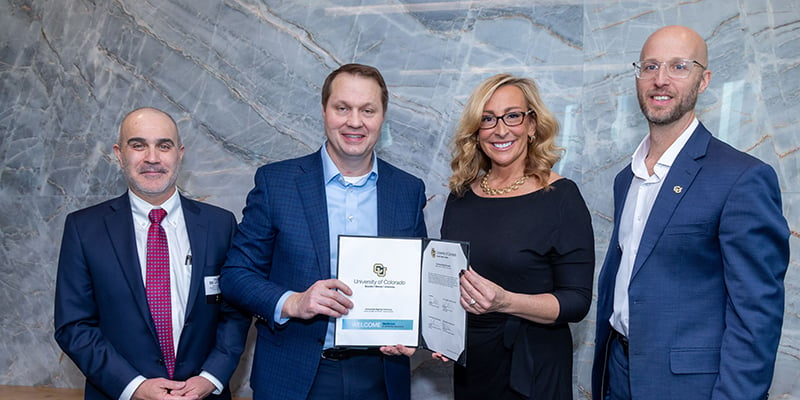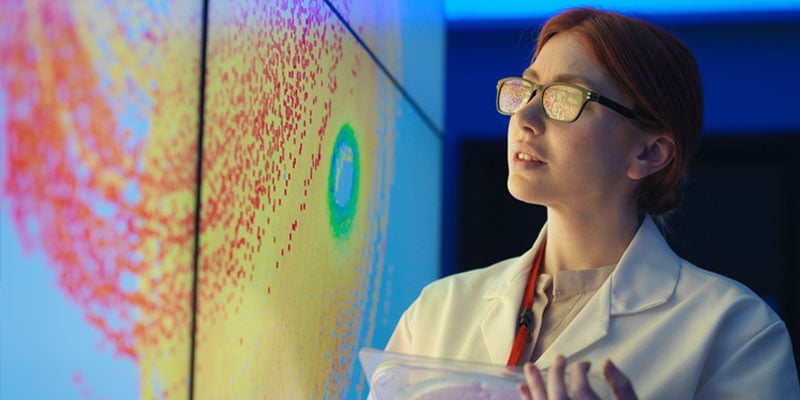Allowing a boy’s dream of playing Friday night football, keeping an asthmatic preschooler out of the ER, and guiding a young woman back on track to graduation are all in a day’s work for the Sheridan Health Services staff.
Led by the University of Colorado College of Nursing, the services include the CU Family Health Clinic and the CU Youth Health Clinic, where providing every Sheridan School District 2 student equal access to quality healthcare tops the to-do list.
At this year’s districtwide registration, the medical, dental and behavioral health teams from both clinics conducted more than 60 sports physicals and 90 dental screenings for students who might have otherwise not gotten those services.
Staff members also helped uninsured qualified families enroll in government-funded programs, provided behavioral health screenings and connected entire families to services.
“My fear would be that they would not receive health care anywhere if it weren’t for this program,” Superintendent Patrick Sandos said of his students. “Having these services — and having them so near our schools — is just a godsend for our kids and their families,” Sandos said.
Access provides even hidden benefits
Alexis Barrere, MSN, PNP, a career-long advocate of community health who leads the youth clinic, said her program’s benefits are multifaceted and sometimes bigger than they may appear.
“Because of the sports physical, for example, there are 65 more kids from the district participating in sports,” Barrere said. Athletics offer benefits in all aspects of health, including physical, mental and behavioral, she said.
In addition to building fitness, self-discipline and camaraderie, sports help prevent risky behavior, Barrere said. “Whenever you are involved in something extracurricular, you are less likely to be off getting into trouble.”
With an early childhood center and four schools in its district, the Sheridan Health Services youth clinic serves patients from 0 to 22, treating everything from dental issues to depression and anxiety to asthma. The school district has the highest homeless population in the state.
Families can also find services for all members at a primary school based health center and the family clinic.
“Some of these kids would end up in the emergency room for their health conditions, because they don’t have a place to go that is close to their home to get asthma management or mental health management,” Barrere said.
‘We're accessing kids where they are, on their turf, in their comfort zone, so they are more willing to come see us.’ – Alexis Barrere, leads the youth clinic
The clinic also helps his students academically, Sandos said. “When you are taking care of those base needs that kids have — health needs, mental health needs, safety and security — they are able to focus where they need to focus.”
Integrated healthcare in their backyard
The clinic’s integrated healthcare team, combined with its providers’ unique collaboration with nurses and social workers at the schools, results in high-quality care for the students in the district, who often struggle with mental health and social stressor issues, she said.
Providing healthcare within the communities and near the school grounds that need it makes a difference, Barrere said.
“We’re accessing kids where they are, on their turf, in their comfort zone, so they are more willing to come see us,” she said.
“We can have a better understanding of what’s happening at home and in school. Especially with mental health concerns, that collaboration makes our care more complete. We’re not always having a missing piece of the puzzle.”
Schools in the district include the Early Childhood Learning Center, Alice Terry Elementary, Fort Logan Northgate 3-8, Sheridan High School and SOAR Academy. Uninsured families pay on a salary-based sliding scale.
Making ‘great things happen’
The medical and behavior health providers often work together as a team with patients. Just the other day, Barrere said, a young woman that she and Anna Padgett Seigel, LCSW, have been working with for a year and half shared an essay with them that she had written for a senior class project.
“She talked about her self-exploration that she came to through counseling and how thankful she is for the services because of where she is now.” The young woman plans to continue school and become a behavioral health therapist for adolescents, Barrere said.
“That’s a perfect example of what we do here and why it’s so important. It’s definitely not overnight, but there are a lot of success stories.”
Sandos said he has always been impressed with the care the clinic’s staff provides and that they obviously care about their patients. “I have a big sign in our office that says ‘kids first,’ and I think that’s their thought, too. So when folks’ thoughts are aligned like that, great things happen.”
Guest contributor: Debra Melani, College of Nursing



